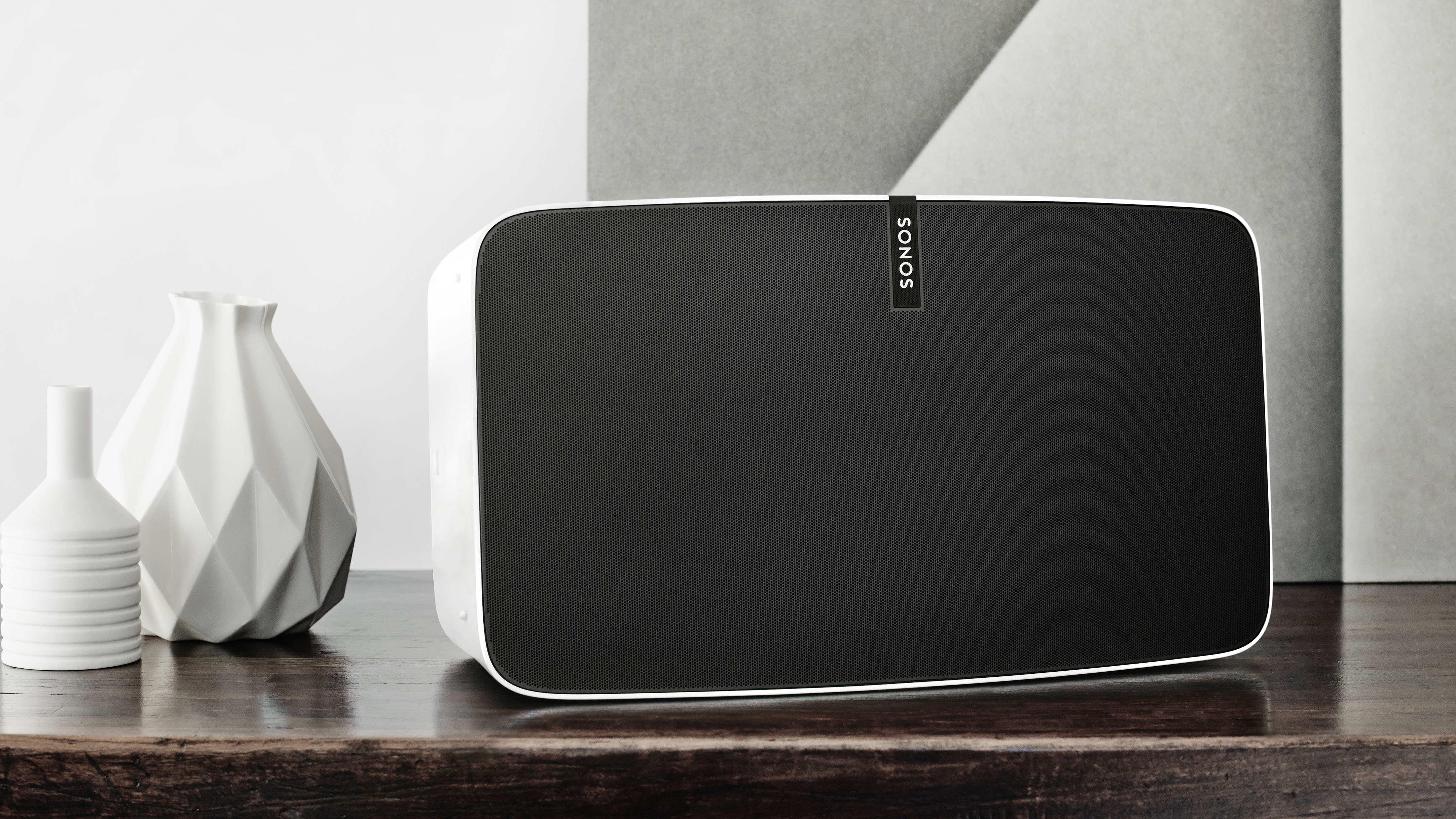TechRadar Verdict
An elegant looking and bombastic sounding speaker that proves Sonos is still king of the streamers.
Pros
- +
Great look
- +
Easy to setup
- +
Powerful sound.
Cons
- -
App could do with a refresh
- -
speaker legs are apparent
- -
Very simple design.
Why you can trust TechRadar
Update: Sonos Play:5 now has Apple AirPlay 2 support, allowing you to wirelessly send audio from your iOS devices from the home screen. To get AirPlay 2 up and running, download the latest version of the Sonos app on your iPhone or iPad, then run the firmware update for your Play:5. After that, swipe up from the bottom of the screen and select the music playback section. In it, you'll find the Sonos Play:5 speaker.
Original review continues below...
Sonos has always been the poster child of music streaming. Its contained service takes the idea of filling up the rooms in your house with music and makes the process simple, never letting the end user see or have to deal with the complicated technology that makes this work.
For years it was dominant in the music streaming field but it was an area that many companies hadn't entered. In 2009, when the first Play:5 was launched (it was originally known as the S5), it was pretty much standalone in its plug-and-play capabilities. Skip to 2015 and Sony, Samsung, Bose, Denon and even Pure are sniffing around audio streaming - each with their own take on multi-room systems.
To make sure that it stays on top Sonos has completely redesigned its flagship speaker, the Play:5, and brought with it its most significant software update in years, in the form of Trueplay and AirPlay 2 support for iOS devices.
Design
The new-and-improved Sonos Play:5 is a Play:5 in name only - it's been completely re-engineered by Sonos. No part has been left the same. It may have that similar lozenge look that the original Play:5 had, but its edges are rounder and the flat foot that was found on the original has completely disappeared, making way for very small legs.
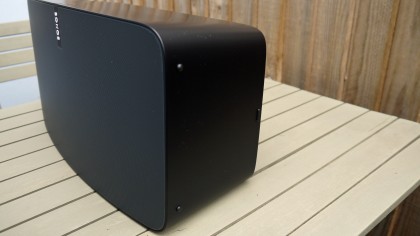
These leg rests are on both the bottom of the Play:5 and the side, because this time around you can use the speaker in either a horizontal or vertical fashion - a sensor inside determines which orientation the speaker is set in and adjusts sound quality and controls accordingly. This also means that you can pair up two Play:5 speakers for stereo sound, which would be a pricey but brilliant way to re-invent any home cinema system.
The physical buttons have gone from the top, too. Sonos' band of designers and engineers have embraced touch controls, making use of a capacitative top that is signified by the logo in the middle of the device.
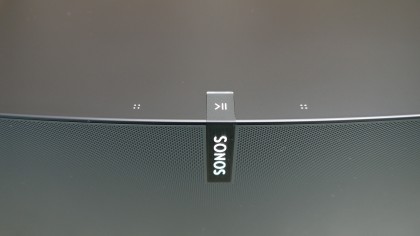
'But won't a logo on the front mess with the acoustics?' we hear you cry - Sonos has thought about this and made it 'acoustically transparent' thanks to 800 holes lasered into the material. This is alongside the 60,000 holes that make up the grill.
According to Sonos, the designers had a fight on their hands to keep the logo tag where it is but we are glad they did - it acts as a central point for the touch control. A control that now allows you to track back and forward through songs, something that has been missing on Sonos' other touch controls. Considering there's no plus or minus signs to point you in the right direction for the touch panel, this is a clever bit of design. It makes something that's all-but invisible feel intuitive to use.
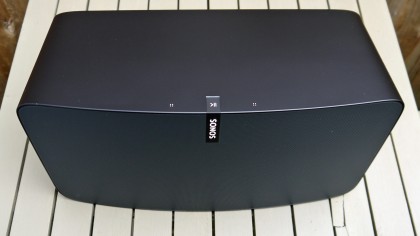
Colour-wise, there is a choice of black or white for the chassis - the grill stays black no matter your choice.
Looks-wise, the Play:5 is definitely a lesson in reduction. There's nothing on the chassis that doesn't need to be there. It's sleek, minimal and will fit easily into any home, not matter the decor.
Features
Round the back things have been simplified, too, with just an Ethernet port, a 3.55mm audio port and a button you need to press to sync the Play:5 with your existing setup. The arrival of this button means that setting up the Play:5 is one of the easiest things to do, though there is a small caveat to this.
My current Sonos setup is WiFi only - I don't have any tethered to an ethernet port. The Play:5 can also work perfectly well on a wireless setup but our unit did need to be connected to ethernet on initial setup. This isn't really an issue but it did mean I had to unplug it from the dining room, cart it over to the router in the lounge and set it up again.
Having to unplug and re-plug in the Play:5, though did mean I paid attention to the unit's plug. It's clear that the designers, in a very Apple was, have made sure that even the plug looks great.
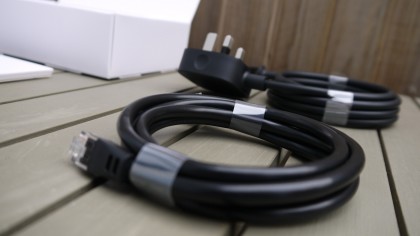
The way the lead has been sealed within the system compliments the minimal look of the Play:5 brilliantly. It's a small detail but if they are that meticulous about the plug then you know the rest of the device is going to be built well.
A sole ethernet port means that the Play:5 has lost an ethernet connection in this iteration. It also doesn't have the optical port that can be found on the Sonos Playbar.
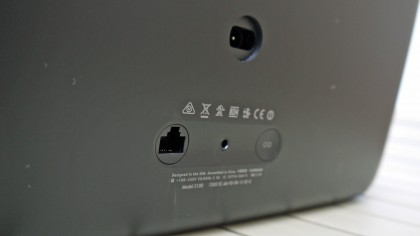
Underneath the grill, things have dramatically changed. Instead of two mid-woofers, there's now three 10cm drivers powering the mid range. These are backed by two 20mm tweeters situated on the left and right of the device (in cones) and one 22mm tweeter in the middle.
This is by far the most powerful speaker Sonos has created - it built these components by taking a look at what was in the Play:1 and upgrading the drivers accordingly.
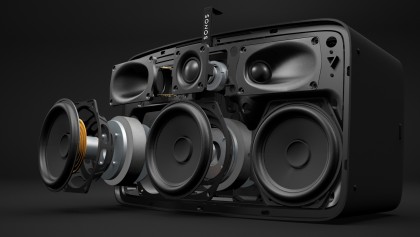
All of this is nestled beneath a sealed acoustic enclosure. Again, this is a marked difference from the original Play:5, which was vented. While it has meant Sonos has had to do some clever things to make sure the heat of the speaker escapes, it's promising that this improves the bass and clarity of the sound, while making sure extraneous noise is kept away.
Marc Chacksfield is the Editor In Chief, Shortlist.com at DC Thomson. He started out life as a movie writer for numerous (now defunct) magazines and soon found himself online - editing a gaggle of gadget sites, including TechRadar, Digital Camera World and Tom's Guide UK. At Shortlist you'll find him mostly writing about movies and tech, so no change there then.
